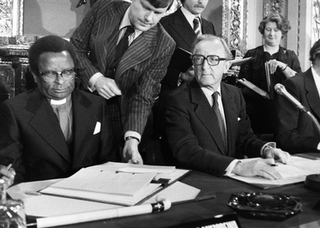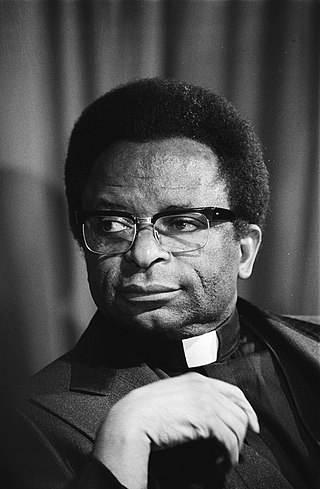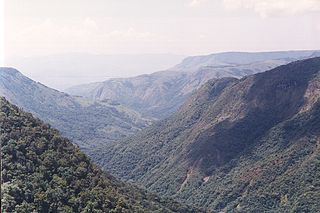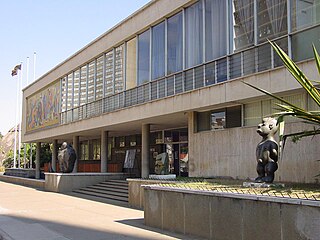
Zimbabwe Rhodesia, alternatively known as Zimbabwe-Rhodesia, also informally known as Zimbabwe or Rhodesia, was a short-lived sovereign state that existed from 1 June 1979 to 18 April 1980, though it lacked international recognition. Zimbabwe Rhodesia was preceded by another state named the Republic of Rhodesia and was briefly under a British-supervised transitional government sometimes referred to as a reestablished Southern Rhodesia, which according to British constitutional theory had remained the lawful government in the area after Unilateral Declaration of Independence (UDI) in 1965. About three months later, the re-established colony of Southern Rhodesia was granted internationally-recognized independence within the Commonwealth as the Republic of Zimbabwe.

Manicaland is a province in eastern Zimbabwe. After Harare Province, it is the country's second-most populous province, with a population of 2.037 million, as of the 2022 census. Making it the third most densely populated province after Harare and Bulawayo provinces. Manicaland was one of five original provinces established in Southern Rhodesia in the early colonial period. The province endowed with country's major tourist attractions, the likes of Mutarazi Falls, Nyanga National Park and Zimbabwe's top three highest peaks. The province is divided into ten administrative subdivisions of seven rural districts and three towns/councils, including the provincial capital, Mutare. The name Manicaland is derived from one of the province's largest ethnic groups, the Manyika, who originate from the area north of the Manicaland province and as well as western Mozambique, who speak a distinct language called ChiManyika in Shona.

Mutare, formerly known as Umtali until 1982, is the capital and largest city in the province of Manicaland. It is the third most populated in Zimbabwe. Having surpassed Gweru in the 2012 census, with an urban population of 224,802 and approximately 260,567 in the surrounding districts, Mutare adds to the wider metropolitan area a total population of over 500,000 people. Mutare is also the capital of Manicaland Province and the largest city in eastern Zimbabwe.

The Lancaster House Agreement refers to an agreement signed on 21 December 1979 in Lancaster House, following the conclusion of a constitutional conference where different parties discussed the future of Zimbabwe Rhodesia, formerly known as Rhodesia. The agreement effectively concluded the Rhodesian Bush War. It also marked the nullification of Rhodesia's Unilateral Declaration of Independence, as British colonial authority was to be restored for a transition period, during which free elections under supervision by the British government would take place. Crucially, ZANU and ZAPU, the political wings of ZANLA and ZIPRA, would be permitted to stand candidates in the forthcoming elections. This was however conditional to compliance with the ceasefire and the verified absence of voter intimidation.

Abel Tendekayi Muzorewa, also commonly referred to as Bishop Muzorewa, was a Zimbabwean bishop and politician who served as the first and only Prime Minister of Zimbabwe Rhodesia from the Internal Settlement to the Lancaster House Agreement in 1979. A United Methodist Church bishop and nationalist leader, he held office for less than a year.

Zimbabwe Cricket (ZC), previously known as the Zimbabwe Cricket Union (ZCU) until 2004, is the governing body for the sport of cricket in Zimbabwe. Zimbabwe Cricket is a full member of the International Cricket Council (ICC), and administers the Zimbabwe national cricket team, organising Test tours, One-Day Internationals and Twenty20 Internationals with other nations. It also organises domestic cricket, including the Castle Logan Cup, the Coca-Cola Metbank Pro50 Championship and the Stanbic Bank 20 Series in Zimbabwe.

Chimanimani, originally known as Melsetter, is a mountainous district in Manicaland Province of eastern Zimbabwe. The district headquarters is the town of Chimanimani.
The government of Zimbabwe is the main provider of air, rail and road services; historically, there has been little participation of private investors in transport infrastructure.

Mbare, originally known as Harari, is a suburb in the south of Harare, Zimbabwe. Founded in 1907 as a township, it includes an informal settlement. Mbare Musika is the largest farm produce market in Zimbabwe.

Pungwe River is a 400 km (250 mi) long river in Zimbabwe and Mozambique. It rises below Mount Nyangani in the Eastern Highlands of Zimbabwe and then flows southeastwards through the Manica and Sofala provinces of Mozambique. The Pungwe enters the Urema Valley, the southernmost portion of the Great Rift Valley, where it forms the southern boundary of Gorongosa National Park. The Urema River joins it, and the river follows the rift valley southward. Large seasonal wetlands form around the Pungwe and Urema rivers in the rift valley section. It empties into the Mozambique Channel at Beira, forming a large estuary. It is one of the major rivers of Mozambique and often causes floods.

The National Gallery of Zimbabwe (NGZ) is a gallery in Harare, Zimbabwe, dedicated to the presentation and conservation of Zimbabwe's contemporary art and visual heritage. The original National Gallery of Rhodesia was designed and directed by Frank McEwen, a British citizen credited with bringing Shona Sculpture to the spotlight. The Gallery was officially opened by Queen Elizabeth The Queen Mother on July 16, 1957, and Queen Elizabeth II attended the sixth Zimbabwe Heritage Exhibition there in October 1991.
Mutasa District is one of seven districts in Manicaland Province of Zimbabwe. Mutasa District is located 30 km northeast of Mutare and stretches up to the Honde Valley, which is about 100 km northeast of Mutare along a tarred road that branches off the Nyanga road.
Mutare Sports Club is a cricket ground in Mutare, Manicaland Province, Zimbabwe. It is located just to the south-east of the city centre, next to Main Park.
The Bulawayo City Council is the governing authority of the city of Bulawayo in terms of Zimbabwe 2013’s constitution Amendment 20. There 29 councilors representing the 29 wards in that city. These councilors are elected by the residents of Bulawayo.
Mutare Airport is an airport serving Mutare, the fourth largest city in Zimbabwe and the capital of Manicaland province.
The 2016 Zimbabwe Premier Soccer League is the 37th season of top-tier football in Zimbabwe. The season began on 1 April 2016 when How Mine took on newly promoted Bulawayo City at White City Stadium. CAPS United won their fifth league championship and first in 11 years.
The Mayor of Mutare is the executive of the government of Mutare, Zimbabwe. The Mayor is a member of the Mutare City Council, and is assisted by a deputy mayor. The Mayor uses the style "His Worship". The current mayor is Simon Chabuka.

Mutare District is a district in Manicaland Province of eastern Zimbabwe. The district headquarters is the city of Mutare.
Allan Norman "Rusty" Markham is a Zimbabwean farmer and politician who was elected to the National Assembly of Zimbabwe for Harare North in the 2018 general election as a member of the MDC Alliance. He crossed the floor to the newly formed Citizens Coalition for Change and was elected Member of Parliament for the neighbouring Harare East constituency in the 2023 general election.










